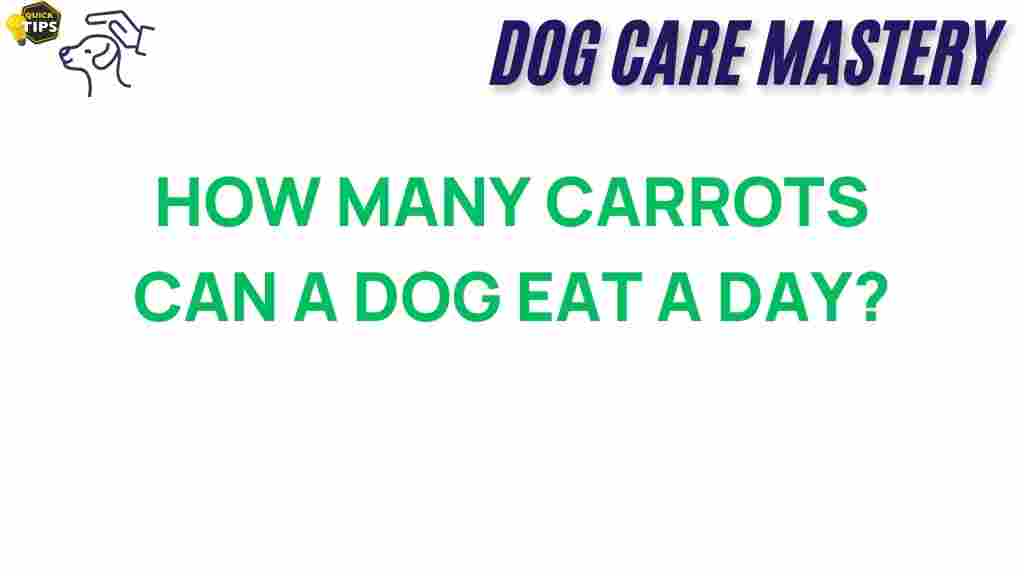How Many Carrots Can Your Dogs Safely Devour?
When it comes to treating our furry friends, many dog owners wonder about the safety and nutritional benefits of various vegetables. Carrots, in particular, have gained popularity as a healthy snack for dogs. But how many carrots can your dogs safely devour? This article will explore the facts about dogs and carrots, providing you with a comprehensive guide to incorporating this crunchy vegetable into your dog’s diet.
The Nutritional Benefits of Carrots for Dogs
Carrots are not only a tasty treat but also packed with essential nutrients. Here are some of the benefits they offer:
- Low in calories: Carrots are a low-calorie snack, making them an excellent choice for dogs that need to watch their weight.
- High in fiber: The fiber content in carrots aids digestion and promotes a healthy gut.
- Rich in vitamins: Carrots are a great source of vitamins A, C, and K, which contribute to your dog’s overall health.
- Dental benefits: Chewing on carrots can help clean your dog’s teeth and freshen their breath.
How Many Carrots Can Dogs Eat?
When it comes to feeding your dogs carrots, moderation is key. A general guideline is to offer carrots as an occasional treat rather than a staple in their diet. The recommended amount can vary based on factors such as your dog’s size, age, and activity level. Here’s a breakdown:
- Small dogs (up to 20 lbs): 1-2 baby carrots or a small piece of a larger carrot.
- Medium dogs (20-50 lbs): 2-4 baby carrots or half a medium-sized carrot.
- Large dogs (50 lbs and above): 4-6 baby carrots or one medium-sized carrot.
Always start with small amounts to see how your dog reacts. Some dogs may experience digestive upset if they consume too many carrots at once.
Introducing Carrots to Your Dog’s Diet
When introducing carrots to your dog’s diet, follow these steps:
- Wash and peel: Ensure the carrots are clean and peel them to remove any pesticides or dirt.
- Cut into appropriate sizes: Depending on your dog’s size, cut the carrots into bite-sized pieces to prevent choking hazards.
- Start slow: Begin with a small piece and monitor your dog for any adverse reactions.
- Observe and adjust: If your dog enjoys the carrot and shows no signs of digestive upset, gradually increase the amount.
Signs of Overconsumption
While carrots are generally safe for dogs, overconsumption can lead to certain issues. Watch for these signs if your dog eats too many carrots:
- Diarrhea or loose stools
- Vomiting
- Gas or bloating
- Signs of discomfort or lethargy
If you notice any of these symptoms, it’s best to reduce the amount of carrots in your dog’s diet and consult your veterinarian if the symptoms persist.
Carrots: A Raw or Cooked Snack?
You can feed your dogs carrots either raw or cooked. Here are the pros and cons of each method:
Raw Carrots
Pros:
- Retain maximum nutrients
- Crunchy texture helps clean teeth
Cons:
- Can be tough for older dogs or those with dental issues
Cooked Carrots
Pros:
- Soft texture is easier for older dogs to chew
- Cooking can enhance the flavor
Cons:
- May lose some nutrients during cooking
- Adding oils or spices can make them unhealthy
Carrots as a Training Treat
Carrots can also serve as an excellent training treat. Here’s how to incorporate them into your training routine:
- Cut carrots into small pieces for easy handling.
- Use them to reward good behavior during training sessions.
- Mix with other healthy treats to keep your dog interested.
Alternatives to Carrots
If you’re looking for other healthy vegetables to add to your dog’s diet, consider these alternatives:
- Green beans: Low in calories and high in fiber.
- Sweet potatoes: Packed with vitamins and a great source of carbohydrates.
- Cucumbers: Hydrating and low in calories.
- Peas: A good source of protein and fiber.
Always remember to introduce new foods gradually and consult your veterinarian if you’re unsure about including them in your dog’s diet.
Potential Risks of Feeding Carrots to Dogs
Though carrots are generally safe for dogs, there are a few risks to consider:
- Choking hazard: Ensure the carrot pieces are small enough to prevent choking.
- Digestive issues: As mentioned earlier, excessive intake can lead to digestive upset.
- Allergic reactions: Some dogs may be allergic to vegetables, so monitor your dog closely when introducing any new food.
Consult Your Veterinarian
Before making significant changes to your dog’s diet, it’s always a good idea to consult your veterinarian. They can provide personalized advice based on your dog’s specific health needs and dietary requirements.
Conclusion
Carrots can be a nutritious and enjoyable snack for dogs when offered in moderation. The key is to ensure you’re providing the right amount based on your dog’s size and health. Always introduce new foods gradually, monitor for any adverse reactions, and consult your veterinarian for tailored advice. With the right approach, carrots can be a wonderful addition to your dog’s diet, providing both health benefits and tasty crunch!
For more information about dog diets, check out our dog nutrition guide.
For a broader perspective on dog-friendly foods, you can explore this external resource.
This article is in the category Nutrition and created by dogcaremastery Team
